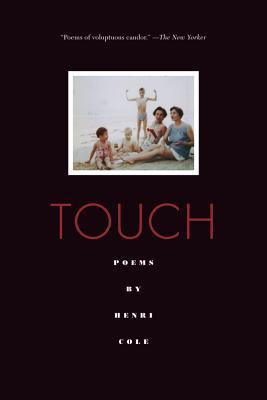Henri Cole's last three books have shown a continuously mounting talent. In his new book, Touch, written with an almost invisible but ever-present art, he continues to render his human topics--a mother's death, a lover's addiction, war--with a startling clarity. Cole's new poems are impelled by a dark knowledge of the body--both its pleasures and its discontents--and they are written with an aesthetic asceticism in the service of truth. Alternating between innocence and violent self-condemnation, between the erotic and the elegiac, and between thought and emotion, these poems represent a kind of mid-life selving that chooses life. With his simultaneous impulses to privacy and to connection, Cole neutralizes pain with understatement, masterful cadences, precise descriptions of the external world, and a formal dexterity rarely found in contemporary American poetry.
Touch is a Publishers Weekly Best Poetry Books title for 2011.
Henri Cole's last three books have shown a continuously mounting talent. In his new book, Touch, written with an almost invisible but ever-present art, he continues to render his human topics--a mother's death, a lover's addiction, war--with a startling clarity. Cole's new poems are impelled by a dark knowledge of the body--both its pleasures and its discontents--and they are written with an aesthetic asceticism in the service of truth. Alternating between innocence and violent self-condemnation, between the erotic and the elegiac, and between thought and emotion, these poems represent a kind of mid-life selving that chooses life. With his simultaneous impulses to privacy and to connection, Cole neutralizes pain with understatement, masterful cadences, precise descriptions of the external world, and a formal dexterity rarely found in contemporary American poetry.
Touch is a Publishers Weekly Best Poetry Books title for 2011.